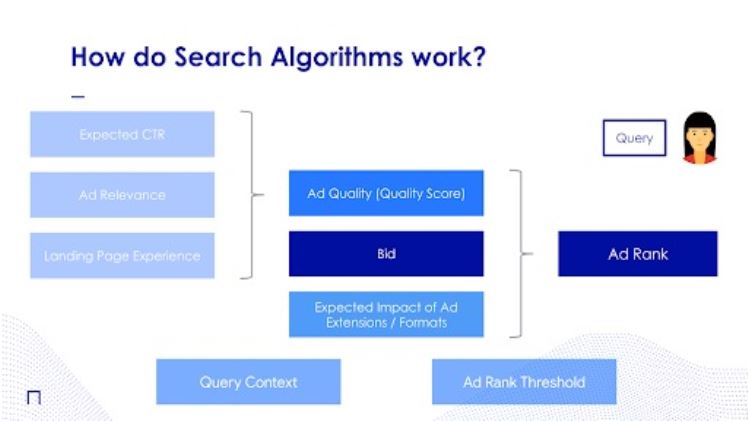Understanding the Google Ads Auction: How Ad Ranking Works

Google Ads, formerly known as Google AdWords, is one of today’s most powerful advertising platforms. It enables businesses to reach a large online audience and effectively promote their products or services. However, success with Google Ads necessitates a thorough understanding of the ad auction and ranking systems. We’ll delve into the complexities of the Google Ads auction and explain how ad ranking is determined in this blog post.
An Overview of the Google Ads Auction
The Google Ads platform is fundamentally an auction system. When a user conducts a Google search or views content on a website that displays Google Ads (such as YouTube or various blogs), a real-time ad auction occurs. Advertisers compete for ad placements in this auction to show their ads to the user.
The following is a simplified step-by-step explanation of how the Google Ads auction works:
- User Trigger: The process starts when a user enters a search query or views a webpage with Google Ads.
- Auction Initiation: In order to determine which ads are relevant to the user’s intent, Google analyzes the search query or the content of the webpage. It then determines which advertisers bid on keywords or topics related to the query or content.
- Ad Eligibility: Advertisers with relevant keywords or content targeting are eligible to participate in the auction. However, not all advertisements are eligible for participation; some may be disqualified due to policy violations or low-quality scores.
- Bid Amounts: Each eligible advertiser establishes a maximum bid, which is the most they are willing to pay if their ad is clicked or displayed. Bids can vary greatly depending on factors such as keyword competitiveness and ad quality.
- Ad Rank: Google assigns an Ad Rank to each ad by multiplying the ad’s Quality Score (a measure of ad and landing page quality) by the maximum bid amount.
- Ad Placement: The advertisements with the highest Ad Ranks win the auction and are shown to the user in the order determined by their Ad Ranks. The winning advertisements appear in search results or on the publisher’s website.
- Ad Display: When a user clicks on an ad, the advertiser pays a fee based on their maximum bid. The process is known as “pay-per-click” (PPC) advertising. If it’s a display ad (such as a banner), the advertiser pays only when the ad is displayed, which is known as “cost-per-thousand impressions” (CPM).
Now, let’s look at the key factors that influence ad ranking in the Google Ads auction:
- Quality Rating
Quality Score is an important factor in ad ranking. It’s a metric that ranks each keyword in your Google Ads account from 1 (poor) to 10 (excellent). Quality Score considers factors such as:
- Click-Through Rate (CTR): Your keyword’s historical performance in terms of clicks versus impressions.
- Ad Relevance: The degree to which your ad copy is relevant to the user’s search query or the content of the webpage.
- Landing Page Experience: The quality and relevance of the webpage that users land on after clicking your ad.
Even if your bid amount is lower than competitors’, a higher Quality Score can significantly improve your ad ranking. Advertisers who provide relevant and high-quality ad experiences are rewarded.
- Bid Amount Maximum
The highest amount you’re willing to pay for a click or impression is your maximum bid. While it is important, it is not the only determinant of ad ranking. If your Ad Rank is high enough to secure the top position in the auction, you may have to pay less than your maximum bid.
- Ad Formats and Extensions
Ad extensions are informational pieces that can be added to your ads to make them more informative and engaging. Site link extensions, callout extensions, location extensions, and other options are available. Ad extensions can increase the visibility and appeal of your ad, potentially improving your Ad Rank.
- Advertising Format and Quality
The format and quality of your ad are also important factors in ad ranking. Ads that are well-designed and compelling are more likely to generate clicks and high-quality scores, which can improve your Ad Rank. Furthermore, ad formats that correspond to the user’s query or intent may be prioritized in the auction.
- Keyword Pertinence
Ad ranking is heavily influenced by the relevance of your keywords to the user’s search query. Google strives to display the most relevant ads to users, so if your keywords closely match the user’s intent, your ad is more likely to perform well in the auction.
- Previous Performance
The historical performance of your ad, such as its CTR, conversion rate, and previous Quality Scores, can have an impact on its ad ranking. Ads with a proven track record of providing value to users may have a competitive advantage in the auction.
- Landing Page User Experience
When a user clicks on your ad, the experience they have on the landing page is important. If the landing page is relevant, well-structured, and provides a good user experience, it can help to improve the Quality Score and ad ranking.
- Factors of Geography and Device
When determining ad rankings, Google takes the user’s location and device into account. If you’re targeting specific locations or mobile devices, for example, the performance of your ad in those areas will be considered in the auction for users in those locations or on those devices.
- Time and Competition for Ad Auctions
The ad auction’s dynamics can change throughout the day depending on factors such as competition and user demand. Because bid amounts and ad rankings can change, it’s critical to monitor and adjust your campaigns as needed.
- Ad Position and Click-Through Rate
Your ad’s position on the search results page can influence its click-through rate. Ads in higher positions tend to get more clicks, which can boost their Quality Scores and, as a result, their rankings.
Conclusion
Understanding how ad ranking works in the Google Ads auction is critical for advertisers looking to maximize campaign effectiveness. It’s not just about bidding the most money; Quality Score, ad relevance, and user experience all play important roles.
To be successful with Google Ads, concentrate on creating high-quality, relevant ads, optimizing your landing pages, and regularly monitoring your campaigns. You can improve your chances of securing top positions in the auction and achieving better results for your advertising efforts by constantly improving the quality and relevance of your ads, click here to learn more.
